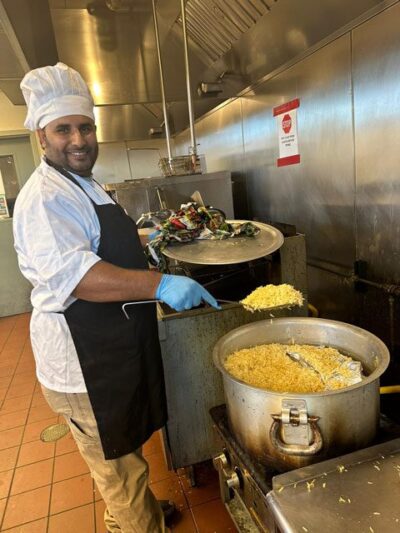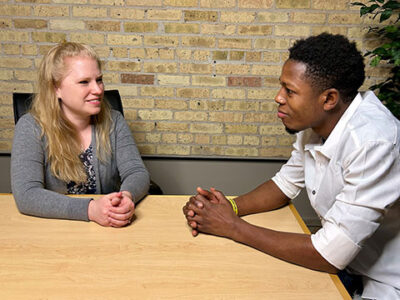WEDC-funded career development initiative helps refugees move into higher-skilled jobs—and helps bridge labor gap in the process

From FEED Kitchens on the East Side of Madison, Bakht Mohammad operates his catering and carry-out business, Afghan Kabul Cuisine.
In August 2021, Bakht Mohammad’s life changed overnight. The trained soldier who was working to support U.S. Special Forces had to leave his home country of Afghanistan suddenly with his family after U.S. troops withdrew.
Speaking through an interpreter, the father of five shared in a recent interview how he was evacuated separately from his wife and children, getting on a plane not knowing where it was going or whether his family would be there. They reunited in Dubai, then received permission to settle in the U.S. and (after a brief stay Virginia) arrived in Wisconsin to make their new home.
Drawing on his previous experience operating a restaurant in Afghanistan’s Kunar Province, Mohammad started a catering business that serves up Afghan cuisine for a Wisconsin audience. From a shared commercial kitchen space on the East Side of Madison, he prepares specialties including flatbreads and rice dishes with meat and aromatic spices—and the creamy firni rice dessert with almonds. Items are available for curbside pickup each Friday, and Mohammad aspires to operate a food truck or even a full-service restaurant one day.
Upon arriving in Wisconsin, Mohammad and his family received assistance from Jewish Social Services of Madison (JSS) to help them connect with housing, employment, and resources to learn English. The federal government has contracts with refugee resettlement agencies in each state to provide assistance to people coming to the U.S., starting with pre-arrival services to help them prepare. But these agencies have traditionally been limited in what they can do beyond initial basic assistance. A new initiative is helping to ease Wisconsin’s labor shortage while also providing flexibility in what the agencies can do to help refugees move into higher-skilled and more fulfilling jobs. In Mohammad’s case, the new program has given case workers at JSS additional flexibility to work with him on expanding his business.
Moving beyond basic employment

Mohammad, a trained soldier who had assisted U.S. Special Forces, settled in Wisconsin in 2021 after he and his family were forced to leave Afghanistan when U.S. troops withdrew.
WEDC provided $1.2 million in funding over the course of two fiscal years (FY23 and FY24) for the Refugee Career Development Services (RCDS) initiative, offered through six of the state’s refugee resettlement agencies via a partnership with the Wisconsin Department of Children and Families Bureau of Refugee Programs (BRP). Working together, WEDC and BRP designed RCDS to support additional staff capacity at the refugee resettlement agencies, with a dual goal of helping to close Wisconsin’s labor gap and simultaneously helping refugees upgrade their employment—for example, moving from a low-wage job to a higher-paid one or achieving recognition for a credential the refugee held in their country of origin so they’re able to practice their profession in Wisconsin.
One refugee who was once a dentist had been working in a fast-food restaurant; although his dentist credential did not fully transfer, his RCDS case worker was able to help him get credentialed and hired as a dental hygienist.
“Many people come to us with a substantial work history, a specific skill, college education or an interest in college education,” says Mary Flynn, refugee program manager at Lutheran Social Services (LSS), one of the six refugee resettlement agencies that are part of RCDS. In addition to their contributions as members of the community, she says, “They’re already contributing to the economy through payroll and property taxes. This program will allow then to contribute at a higher level.”
“Sometimes people have to flee without their documents,” and therefore don’t have proof of their degrees and credentials, Flynn explains. Even if their credentials do transfer, “sometimes there is a barrier philosophically for employers to hire people with a foreign degree,” she says. The refugee resettlement agencies assist with that too—for example, by networking with employers to advocate for hiring refugees and help alleviate concerns.
Connecting skills with workforce needs
Whatever boost refugees might receive from the new initiative, it only builds on their own resourcefulness that propels them forward, says Chris Brockel, manager of FEED Kitchens, the space where Afghan Kabul Cuisine operates. Brockel recalls how Mohammad started his business heading into winter—a tough time in the catering business—but one day came into his office asking for help to print paperwork. Mohammad had narrowly missed a deadline to join a winter farmers market in Beloit and was determined to go there in person for a meeting, despite speaking limited English. Mohammad’s persistence paid off, says Brockel: “He was in the market the next week.”

Annamarie Hansen, Refugee Career Development Services case manager with Lutheran Social Services, worked with Jonson, a young man from the Democratic Republic of the Congo, to connect him with a program at Madison College that combines vocational English language learning with technical skills education to prepare him for a career in information technology.
Annamarie Hansen, RCDS case manager with LSS, worked with Jonson, a young man from the Democratic Republic of the Congo who aspired to a career in information technology. He had a foreign high school diploma but needed to develop his English language skills before starting college. Working with LSS, he was able to connect to a program at Madison College that combines vocational English language learning with technical education. After less than a year in the U.S., he has completed foundational skills training and is on track to earn an associate degree in information technology.
Compared to federal funding and the restrictions that funding carries, this new state-funded initiative offers the agencies more flexibility in what they’re able to do and who they’re able to work with. For example, certain federal funding sources might differentiate between refugee status and humanitarian parolee status (a separate and distinct category of legal immigration), or a refugee’s family members may not qualify for services—but the state-funded initiative has no such restrictions.
Through RCDS, Hansen was able to work with a Ukrainian humanitarian parolee who was interested in a nursing career; despite high demand for workers in that field, the woman’s attempts to connect with nursing education had been derailed by a lack of understanding of her immigration status and eligibility to study. “They just told her they didn’t accept international students,” Hansen recalls. As a result of outreach from LSS, UW-Madison has updated the eligibility information on its website to specifically address humanitarian parolees and make clear that they’re eligible for in-state tuition.
Sometimes the resettlement agencies themselves can develop opportunities for refugees to practice their professional skills. For example, a man who was a judge in Afghanistan has been able to work as a paralegal for an agency that provides legal immigration services—not practicing law at the level he once did, but still using his professional skills and assisting fellow refugees in the process.
Another humanitarian parolee from Afghanistan has put his language skills to use as a medical interpreter and has also expressed interest in legal interpretation. This refugee’s fluency in Dari—a language of lesser diffusion with a large number of speakers among recently arrived immigrants in Wisconsin—will place him in high demand if he is able to obtain the proper credentials, explains Hansen. LSS is helping him navigate that process, since interpreter training programs in Wisconsin tend to be for a specific language, such as Spanish.
Opening doors for career advancement
In another example of limitations the federal funding carries, the refugee resettlement agencies cannot use those funds to provide services for refugees who have been in the U.S. longer than five years. When people first arrive, the focus is on getting a job—any job—to provide for basic needs while they get established in a new country and learn the language, the refugee resettlement agencies say. Many of the refugees, asylum seekers, and humanitarian parolees are also grappling with psychological (and sometimes physical) repercussions of the traumatic events that led them to leave their countries of origin.
After five years, “perhaps they’ve had a chance to learn more English,” says Flynn. “Maybe they feel healthy enough, mentally and physically, to start exploring the professional hopes and dreams they once had.” But that’s precisely when they “age out” of eligibility for federal funding and become disqualified for services through agencies such as LSS. Expenses may also rise as children grow up and head off to college or the family wishes to move to a bigger home.
“What I love about this program is the ability to work with clients when they’re ready to take that step,” says Hansen. “If they’re ready in year seven” after arrival, “we can have that conversation. If they came here as a young child, we can have that conversation.”
Benjamyn Deneen, RCDS program manager with JSS, worked with a client from the Democratic Republic of the Congo whose dream is to work for the United Nations providing medical care in refugee camps. JSS helped her navigate enrollment in the Edgewood College nursing program; by the time she completes her nursing degree, she’ll also be eligible to become a U.S. citizen. “Then she can pursue the Peace Corps, which seems like the most viable pathway to the UN,” says Deneen. “I would be very surprised if she doesn’t reach her goal.”
He’s working with another client, who had 30 years’ experience as a math teacher in Iran, to connect her with tutoring and assistant teaching opportunities so she can stay connected to teaching math even if she’s not fully licensed as a teacher yet.
Deneen says RCDS is helping to plug a labor gap that is ultimately hampering the state’s economic growth. “A lot of manufacturers are really struggling with access to labor,” he says. “They are operating at reduced capacity because they simply can’t staff their facilities.”
The refugee resettlement agencies talk to clients about the “ABCs” of employment: First find A job (any job), then find a Better job, and from there move into a Career. But if that path takes more than five years, refugees can find themselves at a dead end—or at least fumbling to find a path forward in their chosen field. By lifting the five-year time limit, RCDS helps the agencies live up to their wish to support clients through not just steps A and B but C as well. Says Deneen: “Entry-level employment feels more dignified when you know this is step 1 of 10 or even 100.”
The agency has promoted the new initiative primarily through word of mouth, counting on existing clients to spread the word in their families and communities—and in some cases reaching out to past clients who recently timed out of eligibility or are otherwise good candidates for the services. From July 2022 through September 2023, the initiative provided 218 people with services including on-the-job training, vocational training, employability assessments, referrals to job opportunities, assisting with job searches, and skills recertification. As of September 2023, the program had helped 77 different people start new jobs, with 74 of them still employed at the time of reporting.
“At the end of the day, people want to be engaged in their work,” says WEDC Secretary and CEO Missy Hughes. “’We’re thrilled to hear that the flexibility of this new funding source has helped more people achieve the pride of self-sufficiency through fulfilling employment.
“Immigrants are the foundation of a diverse and vibrant society,” Hughes continued. “We are pleased that this partnership is helping refugees to become more integrated in our Wisconsin communities and helping to meet a workforce need in the process.”
